Pert, French star Jacqueline Delubac (1907-1997) was the third wife of actor, dramatist and film director Sacha Guitry. She starred in eleven of Guitry’s feathery comedies in which her husband co-starred. Between the two wars, the charming actress was one of the most seductive stars of French cinema. Life magazine rated her as one of the five most elegant women in the world.
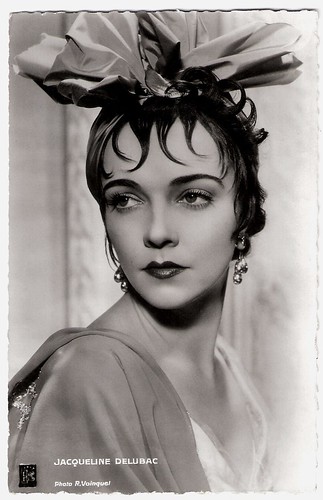
French postcard by Editions et Publications cinématographiques (EPC), no. 142. Photo: R. Voinquel.
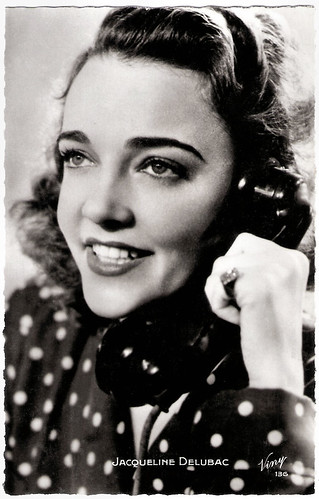
French postcard by Edug, Paris, no. 136. Photo: Viny.
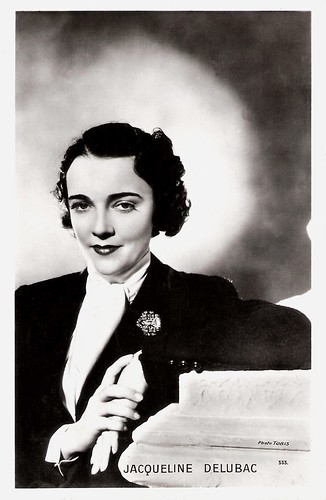
French postcard by Editions Chantal, Paris, no. 533. Photo: Tobis.
Jacqueline Delubac was born Isabelle Jacqueline Basset in Lyon, France, in 1907 (according to some sources 1910). She was the daughter of Isabelle Delubac, whose name she took, and Henri Basset, an industrialist. Her family had amassed a fortune from the manufacture of artificial silk.
From her earliest youth, however, her resolve was to become an actress. In 1927 she arrived in Paris to follow dance and singing courses.
She quickly found small roles in revues and soon moved on to theatre and the cinema. She appeared in films like Chérie (Louis Mercanton, 1930) and Marions-nous/Let’s Get Married (Louis Mercanton, 1931) with Fernand Gravey.
In Une brune piquante/A brunette (Serge de Poligny, 1931), she appeared with Fernandel. Then she joined the cast of Topaze (Louis J. Gasnier, 1932), based on the play by Marcel Pagnol and starring Louis Jouvet.
In the autumn of 1931, she was introduced to Sacha Guitry, who was looking for a young, charming actress to speak with an English accent in his play 'Villa à vendre' (Villa For Sale). Guitry called her, engaged her and courted her discreetly. They married in 1935. At the time Guitry was 50 and Delubac only 28.
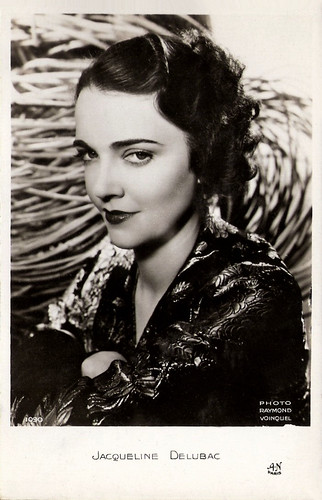
French postcard by AN, Paris, no. 1090. Photo: Raymond Voinquel.
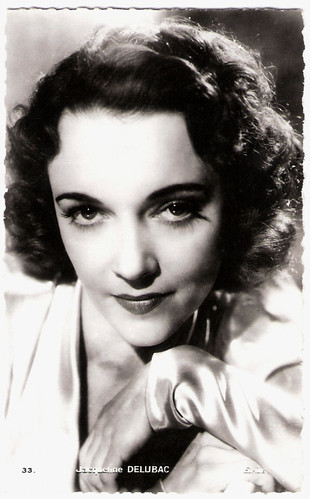
French postcard by Edit. Chantal, Roail, no. 33. Photo: Sipius.
Sacha Guitry made a glamorous stage and cinema star of his young wife. Jacqueline Delubac starred in 23 plays by her husband, 10 new ones and 13 reprises, and appeared in 11 of his films.
Among these films are now classic film comedies like Bonne chance!/Good Luck (Sacha Guitry, Fernand Rivers, 1935) in which she played his gambling partner, Le Roman d'un tricheur/The Story of a Cheat (Sacha Guitry, 1936) with Roger Duchesne, Mon père avait raison/My Father Was Right (Sacha Guitry, 1936), Désiré (Sacha Guitry, 1937) and Quadrille (Sacha Guitry, 1938) with Gaby Morlay.
Her acting style in those films is remarkably natural and modern. Her wit and charms made her one of the most seductive French actresses between the two World Wars.
Her husband clothed her in the finest costumes and coats of the grand designers. She is considered to be the archetypal refined Parisian woman. The American magazine Life rated her as one of the five most elegant women in the world. She would keep up this elegance and refinement till the end of her life.
Gilbert Adair writes in his obituary for The Independent: "She was more than just a chic stooge. Even if one cannot abide Guitry's flamboyant urbanity and nasally whinnying delivery, it is possible to enjoy the dozen feathery comedies in which they co-starred (and all of which he directed) for their pert, soubrettish leading lady, with her near-supernatural vivacity, her deliciously retrousse nose, her oddly flapping lips - you have to see her deliver one of Guitry's mots to know what I am talking about - and her charming artlessness."
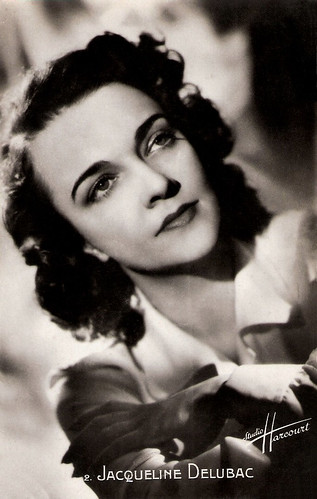
French postcard by SERP, Paris, no. 2. Photo: Studio Harcourt.
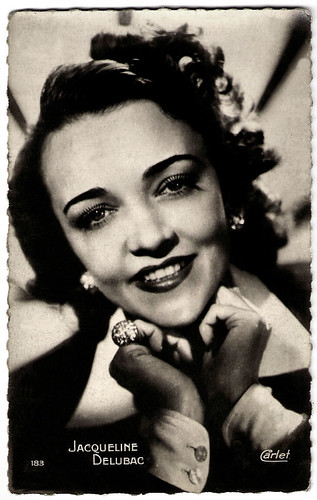
French postcard by Editions P.I., no. 183. Photo: Carlet.

Italian postcard by Rizzoli & C., Milano, 1940. Photo: Pesce.
In 1939, Jacqueline Delubac divorced Guitry. She played in a dozen more films by interesting directors. Georg-Wilhelm Pabst directed her in Jeunes filles en détresse/Girls in Distress (1939) with Micheline Presle). Maurice Tourneur was her director of Volpone (1940), Marcel L'Herbier for La Comédie du bonheur/The Comedy of Happiness (1940) and Jean Delannoy for Fièvres/Fevers (1941) starring Tino Rossi.
Delubac also played in several stage plays. In 1940, a marriage with Leslie Hore-Belisha, a British politician and former War Secretary, was announced and denied. After the war, she married a diamond merchant of Armenian descent, Miran Eknayan.
In the early 1950s, she retired. Her last film was the comedy La vie est un jeu/Life is a Game (Raymond Leboursier, 1951) with Jimmy Gaillard.
From then on she devoted herself to a remarkable collection of impressionist and modernistic art. Later she donated a large part of this collection, including paintings by Degas, Rodin, Renoir, Modigliani, Picasso and Bacon, to the Musée des Beaux-Arts of her native town Lyon. Her splendid 1960s to 1990s costume collection was offered to the Musée de la Mode et du Textile in Paris.
Jacqueline Delubac died in 1997, in Créteil (Val-de-Marne), as a result of injuries sustained in an accident with a cyclist. She was 90.
French trailer for Le Roman d'un tricheur (1936). Source: Gaumont (YouTube).
Trailer for Jacqueline Delubac Expo Lyon. Source: Musée des Beaux-Arts de Lyon (YouTube).
Sources: Caroline Hanotte (CinéArtistes), Gilbert Adair (The Independent), Wikipedia (French), and IMDb.
This post was last updated on 19 December 2023.

French postcard by Editions et Publications cinématographiques (EPC), no. 142. Photo: R. Voinquel.

French postcard by Edug, Paris, no. 136. Photo: Viny.

French postcard by Editions Chantal, Paris, no. 533. Photo: Tobis.
Young and charming
Jacqueline Delubac was born Isabelle Jacqueline Basset in Lyon, France, in 1907 (according to some sources 1910). She was the daughter of Isabelle Delubac, whose name she took, and Henri Basset, an industrialist. Her family had amassed a fortune from the manufacture of artificial silk.
From her earliest youth, however, her resolve was to become an actress. In 1927 she arrived in Paris to follow dance and singing courses.
She quickly found small roles in revues and soon moved on to theatre and the cinema. She appeared in films like Chérie (Louis Mercanton, 1930) and Marions-nous/Let’s Get Married (Louis Mercanton, 1931) with Fernand Gravey.
In Une brune piquante/A brunette (Serge de Poligny, 1931), she appeared with Fernandel. Then she joined the cast of Topaze (Louis J. Gasnier, 1932), based on the play by Marcel Pagnol and starring Louis Jouvet.
In the autumn of 1931, she was introduced to Sacha Guitry, who was looking for a young, charming actress to speak with an English accent in his play 'Villa à vendre' (Villa For Sale). Guitry called her, engaged her and courted her discreetly. They married in 1935. At the time Guitry was 50 and Delubac only 28.

French postcard by AN, Paris, no. 1090. Photo: Raymond Voinquel.

French postcard by Edit. Chantal, Roail, no. 33. Photo: Sipius.
Glamorous and seductive
Sacha Guitry made a glamorous stage and cinema star of his young wife. Jacqueline Delubac starred in 23 plays by her husband, 10 new ones and 13 reprises, and appeared in 11 of his films.
Among these films are now classic film comedies like Bonne chance!/Good Luck (Sacha Guitry, Fernand Rivers, 1935) in which she played his gambling partner, Le Roman d'un tricheur/The Story of a Cheat (Sacha Guitry, 1936) with Roger Duchesne, Mon père avait raison/My Father Was Right (Sacha Guitry, 1936), Désiré (Sacha Guitry, 1937) and Quadrille (Sacha Guitry, 1938) with Gaby Morlay.
Her acting style in those films is remarkably natural and modern. Her wit and charms made her one of the most seductive French actresses between the two World Wars.
Her husband clothed her in the finest costumes and coats of the grand designers. She is considered to be the archetypal refined Parisian woman. The American magazine Life rated her as one of the five most elegant women in the world. She would keep up this elegance and refinement till the end of her life.
Gilbert Adair writes in his obituary for The Independent: "She was more than just a chic stooge. Even if one cannot abide Guitry's flamboyant urbanity and nasally whinnying delivery, it is possible to enjoy the dozen feathery comedies in which they co-starred (and all of which he directed) for their pert, soubrettish leading lady, with her near-supernatural vivacity, her deliciously retrousse nose, her oddly flapping lips - you have to see her deliver one of Guitry's mots to know what I am talking about - and her charming artlessness."

French postcard by SERP, Paris, no. 2. Photo: Studio Harcourt.

French postcard by Editions P.I., no. 183. Photo: Carlet.

Italian postcard by Rizzoli & C., Milano, 1940. Photo: Pesce.
Impressionist and modernistic art
In 1939, Jacqueline Delubac divorced Guitry. She played in a dozen more films by interesting directors. Georg-Wilhelm Pabst directed her in Jeunes filles en détresse/Girls in Distress (1939) with Micheline Presle). Maurice Tourneur was her director of Volpone (1940), Marcel L'Herbier for La Comédie du bonheur/The Comedy of Happiness (1940) and Jean Delannoy for Fièvres/Fevers (1941) starring Tino Rossi.
Delubac also played in several stage plays. In 1940, a marriage with Leslie Hore-Belisha, a British politician and former War Secretary, was announced and denied. After the war, she married a diamond merchant of Armenian descent, Miran Eknayan.
In the early 1950s, she retired. Her last film was the comedy La vie est un jeu/Life is a Game (Raymond Leboursier, 1951) with Jimmy Gaillard.
From then on she devoted herself to a remarkable collection of impressionist and modernistic art. Later she donated a large part of this collection, including paintings by Degas, Rodin, Renoir, Modigliani, Picasso and Bacon, to the Musée des Beaux-Arts of her native town Lyon. Her splendid 1960s to 1990s costume collection was offered to the Musée de la Mode et du Textile in Paris.
Jacqueline Delubac died in 1997, in Créteil (Val-de-Marne), as a result of injuries sustained in an accident with a cyclist. She was 90.
French trailer for Le Roman d'un tricheur (1936). Source: Gaumont (YouTube).
Trailer for Jacqueline Delubac Expo Lyon. Source: Musée des Beaux-Arts de Lyon (YouTube).
Sources: Caroline Hanotte (CinéArtistes), Gilbert Adair (The Independent), Wikipedia (French), and IMDb.
This post was last updated on 19 December 2023.
No comments:
Post a Comment